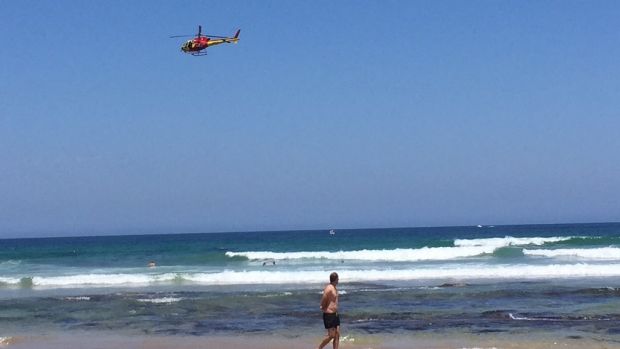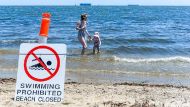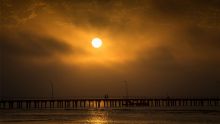Five great white sharks have been spotted in the waters off Great Ocean Road beaches on Friday.
Fairhaven beach was closed after the multiple shark sightings on Friday, with great whites spotted within 500 metres of the shore.
More Victoria News Videos
Lorne Shark sighting
Local fisherman Ben Anderson films a lone shark circling near the Lorne pier earlier in December. Vision courtesy Seven News Melbourne.
VicEmergency issued a dangerous animal alert for beachgoers at Aireys Inlet, Big Hill, Eastern View, Fairhaven, Lorne, Memorial Arch and Moggs Creek because of the sharks which are thought to be 3 to 3.5 metres in length.
The great white sharks were spotted by Life Saving Victoria's helicopter near Moggs Creek near Fairhaven and also Hut Gully near Point Roadknight between 2pm and 4pm on Friday.

"Stay informed and do not enter closed beaches," the alert said. "There have been an increase in the number of shark sightings across the state today."
Sharks believed to be White Sharks were sighted
at Moggs Creek near Fairhaven and Hutt Gully near Pt Roadknight. Swim at a patrolled beach pic.twitter.com/0KgnoucnbJ
— Westpac Helicopters (@LSVWestpacHeli) January 6, 2017
There have been a number of sightings at the popular Fairhaven beach, which had been closed earlier in the day due to other sightings of bronze whaler sharks.
Lorne's famous Pier to Pub swim will take place as normal on Saturday, with thousands of swimmers due to enter the water.
Race director Mark Williamson said there would be extra helicopter patrols and the event would be cancelled if sharks were spotted at Lorne.
"We've cancelled our event twice in the past due to weather but we've never had issues with sharks at Lorne for the Pier to Pub," he said. "Lorne Surf Lifesaving Club has a detailed plan on how to manage our event safely."
In total, there were nine separate sightings of sharks or groups of sharks reported along the coastline on Friday.
It takes the total shark sitings this summer to a record of more than 40, that is more sharks than the last fours years combined.
Download the VicEmergency App for real time updates, and swim at patrolled locations whenever possible. Be aware and prepared. @ Moggs Creek pic.twitter.com/1h83aNtSSC
— Westpac Helicopters (@LSVWestpacHeli) January 6, 2017
The beach at Point Lonsdale, at the entrance to Port Phillip Bay, was also closed at 2pm after sightings of bronze whalers.
Other sightings were recorded at Point Roadknight and Point Addis near Anglesea, around the lighthouse at Aireys Inlet, at nearby Moggs Creek and Fairhaven beaches, Big Hill beach near Lorne and off Thirteenth Beach Road in Ocean Grove.
Ken-Leon Yap, 23, a lifeguard at Fairhaven, said the shark was sighted before the daily patrol had even started.
"I've been lifeguarding for four years now, and this is definitely the most shark sightings I've ever had to deal with," he said.
More than 30 sightings just before Christmas closed Fairhaven beach, which was again closed on Thursday just before 3.30pm after reports of sharks feeding close to shore. They were suspected to be bronze whaler sharks of up to 3.5 metres long.
LSV general manager Paul Shannon said sharks had been spotted every day since Christmas and people should check the Victoria emergency website or app before deciding on a beach swim this summer.
A shark was also sighted in Port Phillip Bay this week.
A Westpac rescue helicopter spotted a shark close to the shore at Chelsea Beach, in Melbourne's south-east, on Wednesday, a Surf Life Saving Victoria spokesman said.There were no swimmers in the area at the time.

The Westpac Rescue helicopter at Point Lonsdale. Photo: Anna Sublet
There was reportedly a second shark sighting at Chelsea Beach on Thursday night, however this one has not been confirmed.
Chelsea Beach is not patrolled by lifeguards so the beach has not been closed, however swimmers have been advised to avoid the area.

Surf life savers lower the flags when a shark is seen in the water. Photo: Anna Sublet
The last reported great white shark attack in Victoria was in 2009, when a four-metre giant bit into a kayak in Portland and flipped it, but left its occupant unscathed in the water.
The last recorded fatal attack by a suspected bronze whaler was in 2014, when a 63-year-old woman, Christine Armstrong, was taken as she lagged behind her daily swimming group at Tathra Beach in New South Wales.
In 2015, a bronze whaler attacked a Victorian surfer at Tyrendarra Beach near Portland, biting him on the left hand. But the man survived.
-with Craig Butt
















